Where are they now?
Transformed by their experience of cross-cultural mission, former Scarbor lay members live a new vision of the world
October 2004
Return to Table of Contents
Print Article
Armella Sonntag
Armella Sonntag and her husband Kim Paisley live in Battleford, Saskatchewan, with their children Kira and John. Aside from full-time jobs, their lives revolve around the children's music and sports activities, and volunteering at the school community.
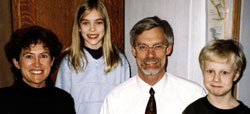
As a member of ATIS (Association of Translators and Interpreters of Saskatchewan) for Spanish/English combinations, Armella does translations for various organizations, including Scarboro Missions and the Canadian Catholic Organization for Development & Peace (D&P).
Armella has been associated with D&P for 10 years, raising awareness and helping organize tours for third world visitors. As a member of D&P's Development Program Committee for Latin America, she has traveled to Paraguay and Bolivia where D&P has brought together partners for program development.
Armella says, "My inspiration and points of reference have been my years of work and community with Scarboro Missions in Panama, Canada and Peru, along with the many incredible people we met and the experiences we had during those years. The images that continue to motivate me are images of people who carry on scratching out a living for their families, in the daily grind of poverty, yet have their sights and faith set on a different and transformed society. These people, at great sacrifice, are active in unions, politics, civil society, church and any avenue that creates spaces for social transformation. Those were such formative and pivotal years. I have been fortunate to be able to build onto those years through activist work with D&P and freelance translating."
Contact Armella at Box 2108, Battleford, SK, S0M 0E0; Email:languagelink@sasktel.net
Dan Anstett
My experiences with Scarboro Missions were life changing. Seeing the First World from the vantage point of the Third World in Chiapas, Mexico, 25 years ago continues to affect me today.
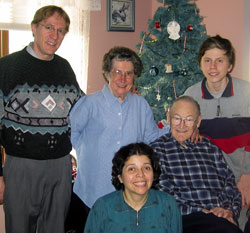
Dan, Sandra and Daniel Anstett with Dan's parents, Margaret and Wilfred Anstett.
Returning to Canada, I became an activist in peace and solidarity groups, and worked full-time at Fred Victor Mission men's shelter. I then took a year off and worked with Peace Brigades International in Guatemala, supporting the relatives of disappeared persons. Heading back to Canada, I stopped in Mexico to attend a conference on Central America, and there met my wife, Sandra, a Guatemalan involved with similar work.
Back in Toronto, I returned to work with the homeless and began volunteer work with Central American refugees. This eventually led to a position with the Quaker Refugee Committee, which in turn got me involved with starting a new agency called the Refugee Information Centre. From there I began working with the City of Toronto Family Residence Shelter, assisting in various capacities with homeless and refugee families.
For the past five years I have come full circle and am now managing two city shelter programs for single men; one program is for seniors and the other for survivors of the mental health system.
For more than 15 years now, I have assisted Scarboro Missions lay formation program by coordinating volunteer placements for lay candidates at shelters and in other ministries to people on the margins in Toronto. I also enjoy attending alumni gatherings and other events that allow my family and I to retain connections with the Scarboro community.
These various work and volunteer experiences all have a connection to the charism of mission first instilled in me 25 years ago by Scarboro Missions.
Rosina Bisci
I thank Scarboro Missions for asking the question, "Where are they now?" It's a question that I often ask of myself.
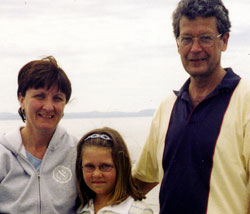
I went to Carabayllo, Peru, 22 years ago and stayed for four years. Though I returned to Canada after that, I never really settled down here. I live with a great sense of gratitude for all that I experience in my life, extremely conscious of the inequalities that exist in our country and our world. There is also a yearning within that does not allow me to settle down. It is a yearning that moves me to do my part-to give, to speak out, to get involved, to listen and respond, sometimes to quietly and expectantly wait.
My husband Alan and I, daughter Sara, and recently my mother, live in Port Robinson in the Niagara Region of Ontario. I teach Grade One at St. Patrick School in Niagara Falls and I love my work. As a family, we have time and again allowed ourselves to be "unsettled" by the people and the world around us. And time and again I have marveled at how God's creative Spirit both stirs and stills the waters.
Helen Harrington-Gaspar
Leaving my home in Halifax to join Scarboro's lay mission program in 1983 was the beginning of a wonderful life-changing adventure. I was sent to live and work in the Philippines and in 1988 I married Fred Gaspar, a Filipino development worker.
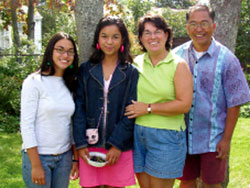
Helen Harrington-Gaspar with here husband Fred and daughters Innah and Julia.
Fred and I moved to Canada in 1990 to be near my family and within the next two years our daughters, Innah and Julia, were born. In those early years, a desire to pursue our mutual commitment to issues of social justice and international development led us to our local Development & Peace (D&P) office, working at the parish and diocesan levels. We have welcomed many D & P visitors to our home, sharing hospitality, solidarity and friendship with people from such places as Kenya, South Korea, the Philippines, South Africa and Nigeria. Fred and I are also involved in our parish Refugee Sponsorship Committee, which through fundraising and education, is working towards the goal of sponsoring a refugee family.
In 1991 we participated in a Canadian International Development Agency consultation on Canadian foreign policy in the Philippines. Scarboro missioner Fr. Pat Kelly, who has served many years in the Philippines, joined our delegation to the conference and gave a passionate plea for the Filipino people. As a result of this consultation, the Canadian government made positive changes. What a super feeling to see that together we can make a difference in the world. We had that same feeling when we became involved in organizing the People's Summit in Halifax, held to coincide with the G7 Summit of world leaders there in 1995.
In our first years back in Canada, I worked with a local office in Halifax giving briefing sessions to development workers going to the Philippines. I helped prepare participants for their entry into the country that had given me so much.
In an attempt to instill a love and appreciation for their Filipino roots, we involved our daughters in the Filipino Association of Nova Scotia. As members of the local Filipino dance group, they perform at the annual multicultural festival on the city's waterfront, and at other events. We have encouraged Innah and Julia to become involved in the world around them and to be active participants in shaping the future.
Life is a journey. You never know where it will lead, but when you stop along the way to glance back, it is a fortunate person who glimpses the touch of God's grace in the hills and valleys. My years with Scarboro Missions were such times of grace and I remain truly grateful to the priests and lay missioners whom I was privileged to walk with on my journey.
Lorraine Reaume, O.P.
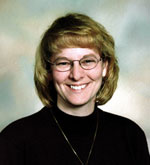
The eventful life I lived as a Scarboro lay missioner has continued. After I left Scarboro Missions, I moved to the United States to join the Adrian Dominican Sisters. My training included a year in Adrian, Michigan, a year in St. Louis, and a study year in Chicago. I made my first profession of vows in the summer of 2000 and served as a campus minister for three years.
In the Dominican spirit of study, I have returned to school and am currently pursuing two degrees, a Master of Divinity and a Master of Theology. As part of this program, I am currently doing a summer unit in Clinical Pastoral Education, learning to be a chaplain and pastoral minister.
I look forward to continuing my education and being led by our mysterious God into yet another interesting and challenging ministry. I try to carry the missionary spirit wherever I go, striving to be open to dialogue, to mutual learning and to spotting and naming the seeds of the reign of God, and I always hold the people and charism of Scarboro Missions in my heart.
As a Scarboro lay missioner, Lorraine Reaume walked with the people of Bolivia and Peru. She also served in Canada, coordinating Scarboro's lay program.
Danny Gillis
The year 1984 will always demarcate for me the change from one vision of the world to another. It was in January of that year that I entered Scarboro's lay missioner formation program. Change came not just from lived experience, such as the years I spent with Scarboro Missions in the Philippines, but from absorbing new ideas and new perspectives and applying these to the suffering of the poor in the world.
For instance, I remember walking through the streets of Toronto talking with my classmate Armella Sonntag about liberation theology and the implications of Christ's option for the poor. It seemed to us to make all the difference. The option for the poor forced us to take sides. As South African theologian Albert Nolan points out, in situations of suffering and conflict sometimes "one side is right and the other wrong, one side is being unjust and oppressive and the other is suffering injustice and oppression. In such a case, not taking sides would be quite wrong." This kind of analysis helped me to make sense of the situations I encountered in the Philippines.
I've tried to apply this perspective in my time as a Scarboro lay missioner and subsequently in the 10 years I've worked as an education coordinator with the Canadian Catholic Organization for Development and Peace. When studying situations of injustice, which I often do in my work, I don't believe we are called to neutrality. We are called to take sides, as Jesus did, with the poor and oppressed. We are called to identify sin not as bad personal choices, but more importantly as participation in systemic injustices that exclude people from the fuller life God promised them.
Sonia and Merv Michalyshen
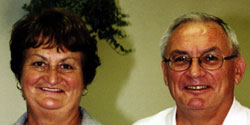
Sonia and Merv Michalyshen were assigned to work in Malawi, one of the poorest countries in the world. Merv worked as a school teacher, friend and confidant to 140 young men at the local minor seminary and secondary school. Sonia, a nurse, worked at a health clinic. She also helped develop an HIV/AIDS awareness program funded by the Canadian International Development Agency (CIDA) in the northern district of Rumphi. Before returning to Canada, Sonia trained local volunteers to take over the project, which continues to expand its services in the district.
Back in Winnipeg, Sonia and Merv began the difficult process of readjusting to Canadian life. The people of Malawi, "the warm heart of Africa," remained in their blood. This led to a commitment to continuing the service of mission. Recalling her experience in Malawi and the lack of the most basic medical necessities, Sonia, along with a nursing colleague, founded International HOPE Inc. This volunteer organization collects valuable medical supplies unwanted by Canadian hospitals and ships them to developing countries.
Although Malawi was the first to receive supplies, International HOPE now partners with the Mennonite Central Committee and Canadian Food for Children to send containers of medical supplies to several developing countries. Sonia and Merv are proud to be part of this expanding volunteer organization.
Merv is also writing a book that is greatly motivated by his experiences of cross-cultural mission in Malawi. The book is into its final stages and may be published in 2005.
Despite their busy schedule, Merv and Sonia enjoy winter curling, and spending time with family and friends. Their biggest pride and joy are their four granddaughters, two of whom were born while they were in Malawi.
Today Sonia and Merv continue to promote Scarboro Missions in their parish and region, inviting others to experience the incredible journey of overseas mission. Their involvement with Scarboro Missions was a life-changing experience for which they are immensely grateful. The lessons of the Beatitudes have taken on a real meaning. Realizing their role in life is to respond to God's mandate to serve the marginalized, Sonia and Merv dream of one day returning to overseas mission.
Return to Table of Contents
Print Article